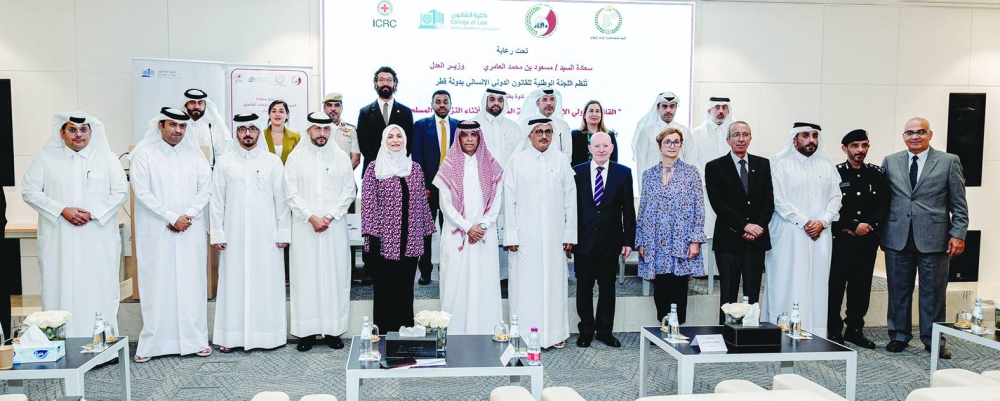The Qatari-Jordanian legal symposium on migrant protection kicked off Tuesday at Qatar University. It is organised by the the two countries' National Committee for International Humanitarian Law, in co-operation with Qatar University and the International Committee of the Red Cross (ICRC) Mission in Qatar, in the presence of HE the Minister of Justice Masoud bin Mohamed al-Amri, HE Qatar University President Dr Omar Mohamed al-Ansari, and a number of senior officials and experts in international humanitarian law.
During his attendance at the opening of the symposium, HE al-Amri reaffirmed Qatar's commitment to protecting migrants at times of armed conflict, in addition to its keenness on resolving disputes through peaceful and diplomatic means, emphasising the need for all parties to adhere to the principles and provisions of international humanitarian law.
HE the Minister of Justice noted Qatar-Jordan partnership and co-ordination in upholding international humanitarian law, resolving disputes peacefully, and providing the means to support and protect refugees in conflict areas. Additionally, he commended the deep partnership with the International Organisation for Migration (IOM) and ICRC in providing support to refugees in conflict areas.
HE al-Amri expressed his confidence that the symposium will produce important recommendations that would strengthen national efforts, as well as regional and global partnerships aimed at enhancing the role of international humanitarian law in protecting migrants during armed conflicts.
At the opening, HE Justice Ministry Undersecretary and chairman of the National Committee For International Humanitarian Law Sultan bin Abdullah al-Suwaidi welcomed participants and stressed the ever-growing need for safety and security in a world where international humanitarian law is being violated, causing people to flee their homes in search of safety.
Al-Suwaidi discussed the political, economic, and social dimensions of migration, and noted that the symposium's goal is the optimal application of international humanitarian law and reducing migration in all its forms.
For his part, HE Chairman of the Jordanian National Committee for International Humanitarian Law retired Lt. Gen. Mamoun al-Khasawneh praised Qatar's support to migrants during armed conflicts, and commended the partnership between the two committees, spreading the culture of international humanitarian law regionally and globally.
He stressed the symposium's significance in addressing the phenomenon in question; a source of global concern. Al-Khasawneh touched on the world's largest refugee movement, that of Syrian refugees to Jordan, Lebanon, and Turkiye, followed by the Ukrainian refugee crisis, a case which demonstrated an imbalance in global support provision to refugees.
For her part, the head of the ICRC Mission, Cherine Pollini, praised Qatar and Jordan for their support of migrants and refugees. Additionally, she noted the huge migration movements in light of armed conflicts and economic instability, and she shed light on ICRC's protection programmes provided to migrants.
Qatar University College of Law Dean Dr Talal Abdulla al-Emadi highlighted the symposium's importance due to its focus on a substantive international humanitarian law issue, its contribution to increased co-operation among concerned parties, and paving the way for future activities.

